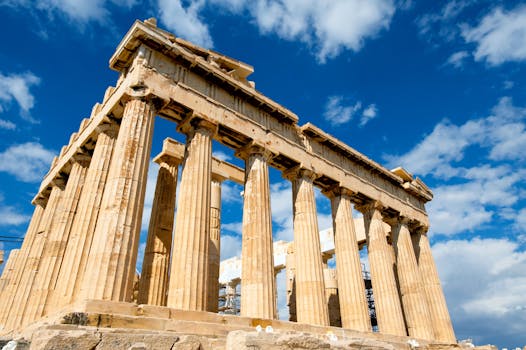Athens, Greece: Cradle of Western Civilization

Athens, Greece, often referred to as the cradle of Western civilization, is a city steeped in history and culture. This ancient metropolis has significantly influenced the development of democracy, philosophy, arts, and sciences. The capital city of Greece, Athens has a rich heritage that dates back over 3,000 years, making it one of the oldest cities in the world.
The city's historical significance is evident in its numerous archaeological sites and monuments. The Acropolis, crowned by the Parthenon temple, stands as a testament to Athens' glory during the classical era. Visitors can also explore the Ancient Agora, where Socrates once taught and where democracy was first practiced. These landmarks offer a glimpse into the past and highlight Athens' role in shaping modern Western thought.
Athens is not just about ancient history; it is a vibrant city that seamlessly blends its past with the present. Modern Athens is bustling with life, featuring lively neighborhoods, contemporary art galleries, and a dynamic culinary scene. From traditional tavernas serving authentic Greek dishes to trendy cafes and bars, Athens offers a unique blend of old-world charm and contemporary lifestyle.
The Historical Landmarks of Athens
Athens boasts some of the most iconic historical landmarks in the world. The Acropolis is perhaps the most famous of them all. This ancient citadel, situated on a rocky outcrop above the city, includes several buildings of great architectural and historic significance. The Parthenon, dedicated to the goddess Athena, is the centerpiece of the Acropolis and symbolizes the zenith of classical Greek art.
Another must-visit site is the Ancient Agora. Once the heart of ancient Athens, it was a place for commerce, politics, and social gatherings. The Agora houses several important structures such as the Stoa of Attalos and the Temple of Hephaestus. Walking through these ruins gives visitors an insight into daily life in ancient Greece.
The Temple of Olympian Zeus, although not as well-preserved as other monuments, still impresses with its grandiosity. Initiated in 6th century BC but completed during Roman Emperor Hadrian’s reign in 2nd century AD, this temple was one of the largest in antiquity.
Additionally, visitors should not miss out on exploring other key historical landmarks like Hadrian’s Arch and the Theatre of Dionysus. These sites collectively narrate the rich tapestry of Athenian history and its lasting influence on Western civilization.
Museums and Cultural Institutions
Athens is home to several world-class museums that house invaluable artifacts from various periods of Greek history. The National Archaeological Museum is one such institution that offers an extensive collection ranging from prehistoric times to late antiquity. Its exhibits include sculptures, pottery, jewelry, and frescoes that provide insights into ancient Greek life.
The Acropolis Museum is another top attraction. Located near the Acropolis hill, this modern museum showcases artifacts found on the Acropolis site itself. Visitors can marvel at statues from the Archaic period and friezes from the Parthenon while enjoying panoramic views of Athens.
For those interested in Byzantine history, the Byzantine and Christian Museum offers an impressive array of religious artifacts from this era. The Benaki Museum also deserves mention for its diverse collection that spans from prehistoric times to modern Greece.
These cultural institutions play a crucial role in preserving Athenian heritage while educating visitors about Greece's profound impact on global culture.
Modern Athens: A Blend of Tradition and Innovation
While deeply rooted in history, modern Athens is a dynamic metropolis that embraces innovation without losing its traditional charm. Plaka neighborhood exemplifies this blend perfectly with its narrow streets lined with neoclassical buildings housing shops selling everything from souvenirs to handmade crafts.
The Monastiraki Flea Market offers another glimpse into contemporary Athenian life while retaining historical elements through its location near significant ancient sites like Hadrian’s Library.
Psyri district has emerged as one of Athens’ trendiest areas filled with street art murals adorning old buildings alongside hip cafes & restaurants offering both traditional Greek cuisine & international flavors alike.
| Neighborhood | Highlights |
|---|---|
| Plaka | Neoclassical architecture, souvenir shops |
| Monastiraki | Flea market, proximity to ancient sites |
| Psyri | Street art murals; trendy cafes & restaurants |
Athenian Cuisine: A Culinary Journey
A trip to Athens would be incomplete without indulging in its culinary delights rooted deeply within Mediterranean traditions yet infused with modern twists by innovative chefs across citywide eateries catering diverse palates alike!
Savoring classic dishes like moussaka (a layered casserole), souvlaki (grilled meat skewers) or spanakopita (spinach pie) at local tavernas provides authentic gastronomic experiences whereas dining upscale restaurants helmed by award-winning chefs showcases sophisticated contemporary takes on traditional recipes elevating gastronomic adventures altogether!
Visiting central markets like Varvakios Agora allows sampling fresh produce directly sourced regional farms perfect ingredients form basis delicious meals prepared homes around country further enriching understanding culture culinary heritage uniting people through shared love food flavors embody spirit hospitality generosity inherent Greek ethos!
Practical Tips for Visiting Athens
- Best Time to Visit: Spring (April-June) and Fall (September-November) offer pleasant weather while avoiding peak tourist crowds, ensuring enjoyable sightseeing experiences amidst mild temperatures and blooming landscapes. These seasons are ideal for outdoor explorations in both urban and countryside settings.
- Getting Around: Athens boasts an efficient public transportation network comprising buses, metro, and trams that facilitate convenient navigation to the city’s major attractions in an affordable manner. Taxi services are also readily available, ensuring hassle-free commutes to desired destinations within and beyond metropolitan boundaries.
- Language: While Greek is the official language and widely spoken, especially among older generations, the younger populace is increasingly fluent in English. This makes communication easier for travelers navigating various aspects of their trip, such as seeking directions, ordering meals, and purchasing tickets for tours and exhibitions. This enhances the overall visitor experience and fosters meaningful connections with locals.